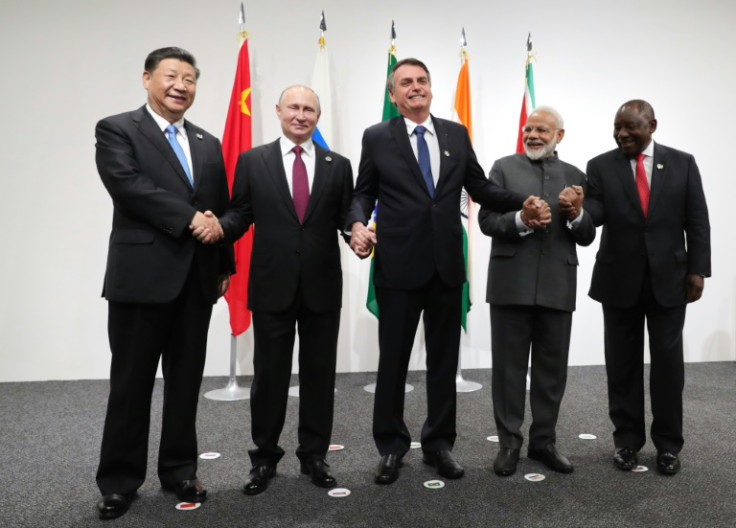BRICS May Appear Polarized With West Vs. Russia-China Contestation As Members Meet Next Week: Expert

KEY POINTS
- South Africa is hosting the 15th BRICS summit from Aug. 22-24
- Chinese President Xi Jinping, Indian Prime Minister Narendra Modi and Brazil's Luiz Inacio Lula da Silva will attend
- BRICS expansion would pose the challenge of not appearing polarized with a "West vs the rest" image, experts say
As the BRICS leaders prepare to meet in South Africa next week, the world is watching keenly to see whether any progress would be made on the group's expansion as dozens of countries queue up to be members of the bloc.
The expansion of BRICS would pose the group with the challenge of not appearing polarized with a "West vs the rest" image, experts say.
Chinese President Xi Jinping, Brazil's Luiz Inacio Lula da Silva and Indian Prime Minister Narendra Modi will be attending the BRICS (Brazil, Russia, India, China and South Africa) summit from Aug. 22-24. Russian President Vladimir Putin, who was hit with an international arrest warrant over alleged war crimes in Ukraine, was not expected to make an appearance.
"The 15th BRICS Summit centers on the 'BRICS and Africa' theme, focusing on five key priorities- just and equitable transition, future-focused education, harnessing opportunities through the African Continental Free Trade Area, post-pandemic recovery, and strengthening multilateralism. The Summit's agenda aims to advance collaboration between BRICS nations and Africa, ensuring a sustainable and prosperous future," Rajeesh Kumar, associate fellow and acting center coordinator at Manohar Parrikar Institute for Defense Studies and Analyses, told International Business Times.
"There are three main issues to be discussed, the first dealing with the expansion of the BRICS group to include new members; second, regarding an economic reorganization among the member countries and creating a plank to rest the economic concerns of the global south; and third, regarding developments in Africa both from the perspectives of geopolitics and geoeconomics," Vivek Mishra, a fellow with Observer Research Foundation's Strategic Studies Program, told IBT.
Although the idea of a BRICS currency was widely discussed in the months ahead of the summit, it was unlikely the topic will be brought to the table at the summit next week. However, one subject that is likely to be discussed is the expansion of the BRICS group, as countries like Saudi Arabia, Argentina, Egypt and many others have shown interest in becoming members.
"Expanding the grouping is the biggest issue on the high-tables of the BRICS. The BRICS Summit 2022 had decided to draft criteria for the membership of the minilateral grouping. It would be interesting to see if this year's Summit meeting produces any concrete results regarding the same. However, the expansion of the BRICS is likely to tilt the grouping towards China," Niranjan Oak, a Research Analyst at Manohar Parrikar Institute for Defense Studies and Analyses in New Delhi, told IBT.
The present five members of BRICS represent 43% of the world's population, 16% of the world's trade, and a larger share of the world's GDP than the Western-dominated G7. BRICS countries were united by the hope of representing the voice of emerging economies, while the U.S. and other rice Western countries dominated the world order.
"BRICS has positioned itself as a voice for the Global South ... striving to balance Western dominance in the global governance system. BRICS aims to reinforce this stance by emphasizing global south cooperation, multipolarity, and multilateral reform that could facilitate equitable resource distribution, economic recovery, and inclusive and sustainable development," Kumar said.
"BRICS has, so far, maintained a balanced character vis-a-vis global affairs. It has allowed the constituents to use the platform to put forth their worldview through the BRICS joint statements. However, after the Covid-19 and Ukraine War, it will be difficult to maintain the balanced profile of the minilateral. The BRICS faces the challenge of appearing polarized amid the contestation between the two sides - the West on the one side and Russia-China on the other," Oak added.
The effects of the COVID-19 pandemic and Russia's war on Ukraine have triggered dramatic shifts in the global order, which also raised the question of how representation would be affected if more countries join the BRICS group.
"As the voice of the global south is concerned, the composition of BRICS with China looming large cannot be truly representative, at least not from a global south perspective," Mishra added. "With the inclusion of more members in the BRICS looming large, the goal of representation may be further difficult. BRICS would want to position themselves as a group which is truly representative in the spirit of the concerns of the global south."
© Copyright IBTimes 2024. All rights reserved.






















